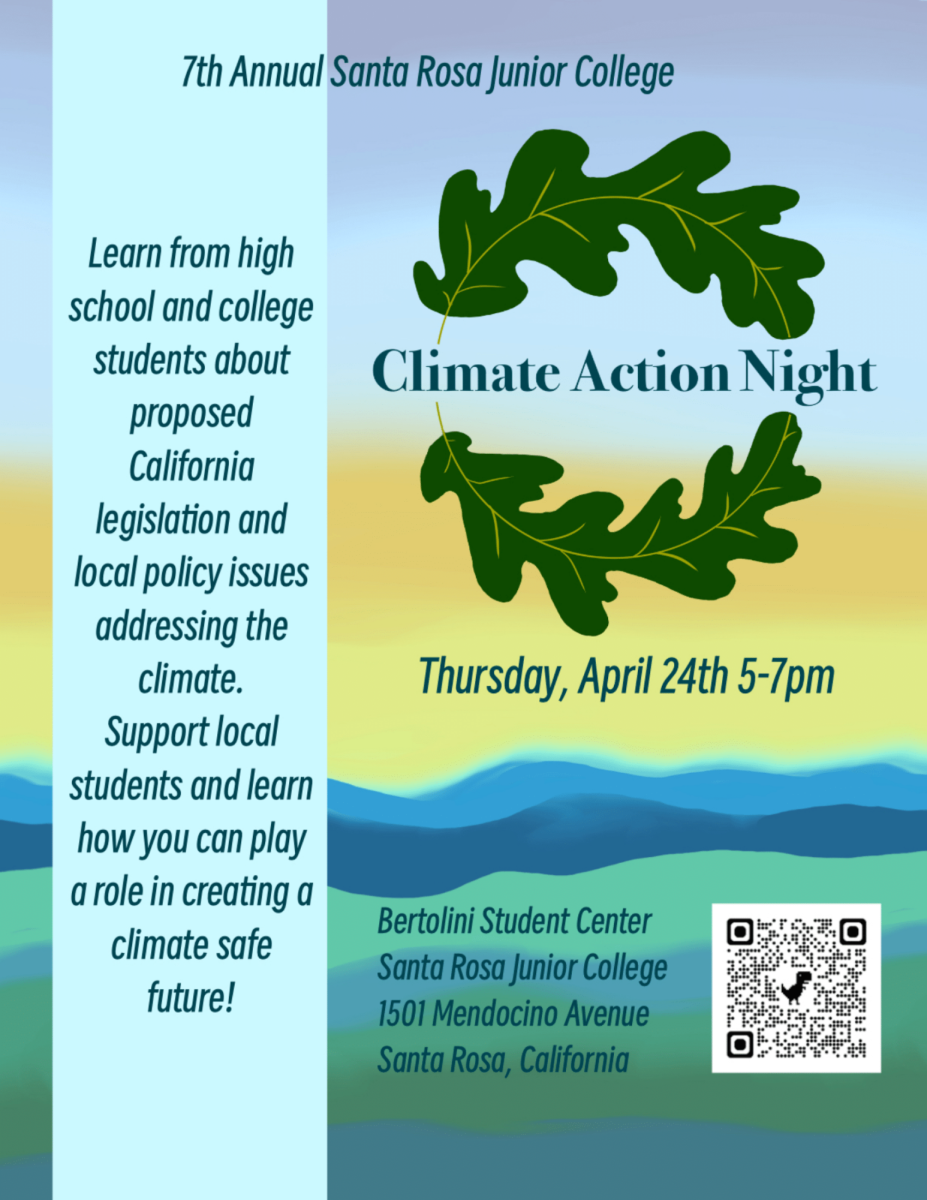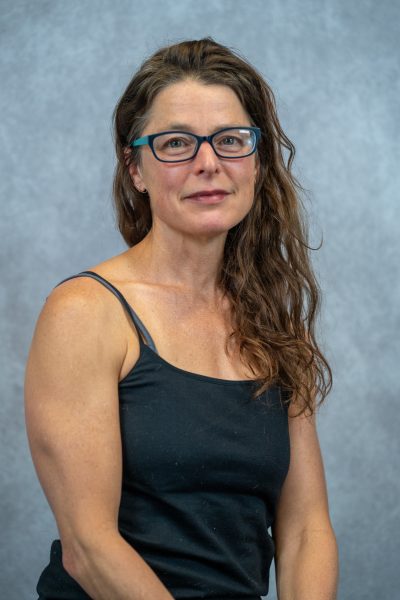Santa Rosa Junior College will host its annual Climate Action Night from 5-7 p.m. Thursday in the Bertolini Student Center.
Students from Santa Rosa Junior College, Sonoma State University and Sonoma County high schools will teach community members about current climate legislation and activism and how they can get involved. The evening will unfold like a science fair with a twist: in the center of the room, tables will have postcards for attendees to fill out to mail to their legislators to advocate for bills that offer adaptations to, remediation from and solutions for climate change.
SRJC botany instructor Abigail Zoger and Sebastopol high school teacher Sunny Galbraith have organized the event for seven years. Each year, more students become involved with climate activism, sharing information, enthusiasm and hope. As Californians face potential cuts to climate solutions programs, community engagement is increasingly essential.
This year’s new climate activists will teach attendees about legislation and plans to improve transit, establish a superfund to pay for gas and oil production pollution, increase housing near transit hubs, and cap electricity rates. About 100 students will present on a total of 14 bills, three local campaigns and two climate issues impacting our community.
Students will engage attendees with posters, activities and giveaways. Come for the fun, meet student activists and leave with a sense of having contributed to improving our environment.
The new activists include two SRJC students and one SSU student who find community and purpose using their voice to make change:
Ashlyn Rogers
Third-year SRJC student Ashlyn Rogers found her calling in environmental policy at the 2024 Climate Action Night. She began as a sociology major at SRJC in Fall 2022, but after taking environmental science and political science classes, she realized she could combine her interests.
“I could do environmental policy and focus more on political science and talking to people and [on] human interactions and the environment, and then the policy around it,” she said.
Last year’s Climate Action Night opened her eyes to all of the legislation around environmental policy, including the issue of blue carbon and protecting coastal areas such as marshes and tidal habitats. “I’ve never been a huge fan of presentations, but getting to present on a bill I was interested in and that I felt was important, and getting to teach the community about it, was really cool for me,” Rogers said.
Rogers found an internship with Sonoma Clean Power, where she teaches community members about clean energy sources and how to use them. At Sonoma Clean Power she learned the value of induction stoves, which heat faster, are safer, and cost less to use than both gas and traditional electric ovens.
“When you think of electric, you think of red hot, really hard to clean,” she said. In contrast, an induction stove has a flat top which heats by sending electromagnetic waves from the surface into the pot.
In the fall, Rogers started the Environmental Sustainability Club, which held weekly discussions and hosted speakers. She has her eye on geothermal legislation which could impact Sonoma County, a large producer of geothermal energy. The proposed bill would develop a roadmap for geothermal development with an efficient permitting process.
In Sonoma County, three geothermal pilot projects seek to expand geothermal energy production at the Geysers facility, which over the years produces less pressure and energy.
This year Rogers is managing the social media and outreach for Climate Action Night. “We really want to get it outside of the JC and let the community know that they should come too,” she said.
Rogers acknowledges that attendees may feel overwhelmed at the dozens of bills presented at Climate Action Night. Rogers values the event because it gives her the chance to hear from students and community members about what is important to them.
“When it comes down to voting, because sometimes it’s hard, when you go to climate action night, you have the opportunity to ask questions to people who are researching this, and they have all the background research. So it’s easy to go and talk to your peers and get answers from them,” Rogers said.
James Back
For Sonoma State University sociology major James Back, Climate Action Night will be his first experience in activism. The former Navy Boatswain’s Mate decided to pursue sociology when he started at the SRJC in 2021 because he wanted to help veterans transition from navy enlistment to civilian life.
Social science research documents the challenges and losses characterizing veterans’ reintegration experience. Many veterans experience post-traumatic stress disorder after completing their service.
When Back de-enlisted, he had the support of family and friends who helped him regain his land legs as a civilian and, later on, enroll at SRJC. But he recognizes how fortunate he was during those transitional years.
Now at SSU, Back is learning how to be proactive on social justice issues through his course with Zeke Baker, sociology professor whose work straddles environmentalism, sociology and political activism.
Back will present a bill that will create a California Superfund Program that would require gas and oil companies to pay for the pollution damage they’ve caused. The bill would require the California Environmental Protection Agency to create a list of the companies responsible for fossil fuel pollution and an audit of these companies going back to 1990.
Responsible companies would be fined for damages which would go into a superfund to pay for clean up and mitigation of, and adaptation to, damages caused by climate change.
Back and his five collaborators on Climate Action Night hope to rally support for the bill. They’ll speak about the bill and its goals and encourage attendees to write to their local representatives.
Back encountered challenges in his first experience in activism. “I didn’t think that it was going to be this difficult, like trying to reach out to people and get support,” Back said.
Looking ahead, he will put his newfound skills in perseverance and public speaking to his career as a reintegration specialist for Veterans Affairs. “That’s the activism that I care about the most, and that I want to be a part of, is helping veterans, get them off the street.”
Abigail Zoger, organizer
Abigail Zoger, SRJC botany and ecology instructor, and Sunny Galbraith, science teacher at Orchard View School, have organized Climate Action Night since 2018. The collaborators have weathered varied political climates. But this year may be the most challenging. “This year is really so difficult, it feels like the ground is crumbling out from underneath people here,” Zoger said.
Organizing Climate Action Night helps Zoger and others find footing in an unstable landscape. “Taking action is an antidote to depression and despair, and that deciding that I have to have certain results for my actions to be worthwhile is a way to double down on despair,” she said.
“One of the reasons that I do climate action night rather than something else, … is to support the people who are already doing amazing climate work,” Zoger said. “The state senators and assembly members, the supervisors, the activists who’ve put together disaster pay for farm workers in Sonoma County.”
In addition to taking concrete steps, such as teaching others about climate legislation and how to communicate with legislators, organizing Climate Action Night re-centers Zoger in a community of like-minded activists. “The people make it worthwhile,” she said.
Zoger pointed to the way the Sonoma County community came together following the multiple seasons of wildfires. “I have to look to the people for my hope and the connections between people in the community and the efforts people build. Because we may not be able to salvage the situation, but we’re going to be here, whether we do or not, we’re going to have to be with each other whatever happens, and have to rely on each other.”




